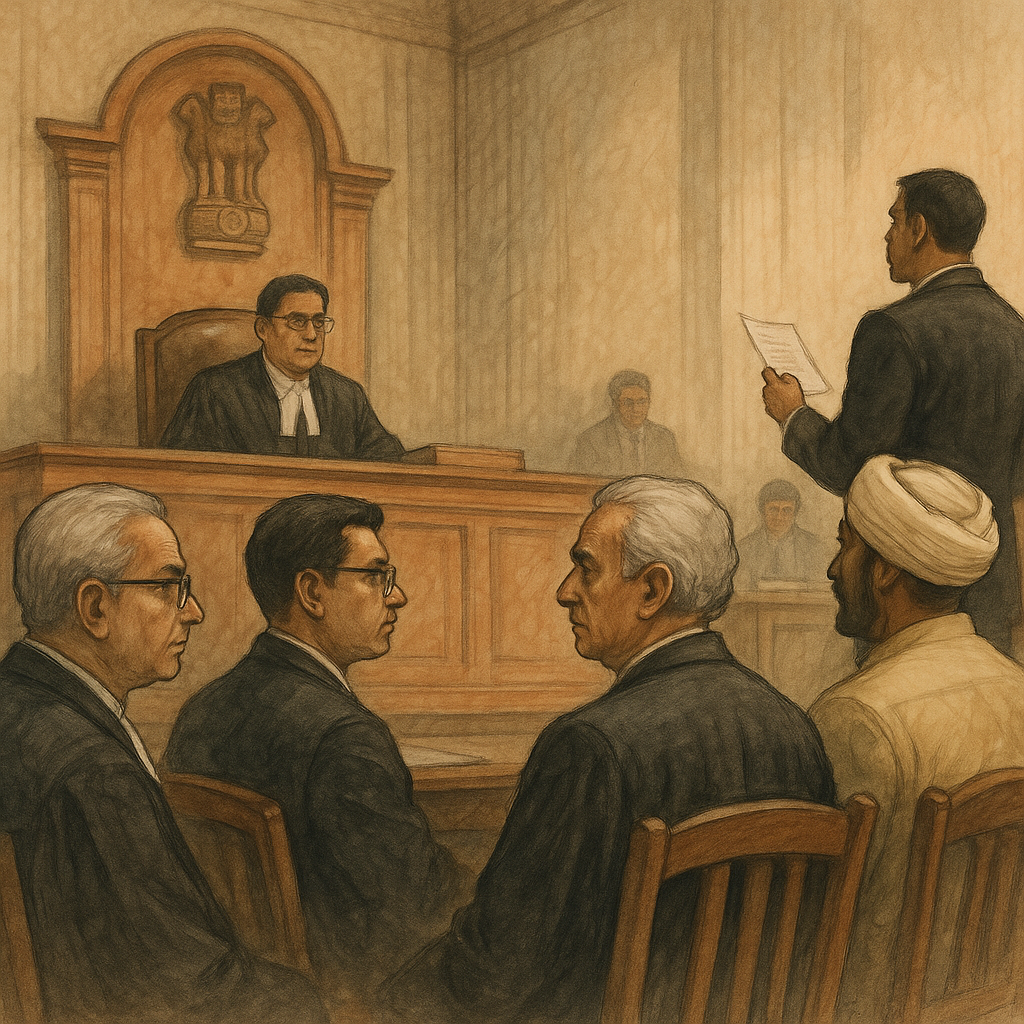Simplified Explanation of the Judgment
In a recent case, the Patna High Court examined whether a construction firm’s non-disclosure of a prior debarment, while submitting a government tender, should have disqualified it from the process. The case was filed by another competing firm (the petitioner), challenging the contract awarded to the successful bidder (respondent no. 4) by the Bihar Rajya Pul Nirman Nigam Ltd. (BRPNNL).
The dispute arose from a government tender for strengthening a 35.1 km road in Gaya district, Bihar. Both the petitioner and respondent no. 4 submitted bids in January 2020. Later, through a lottery system (as all bids were similar and below the estimated value), respondent no. 4 won the contract.
However, the petitioner claimed that respondent no. 4 had previously been debarred by the Building Construction Department via a letter dated 20.10.2018, and this fact was not disclosed in the affidavit required by the tender terms. According to the petitioner, this concealment should disqualify the respondent.
Upon investigation, the Court found that the debarment letter had indeed been issued by an Executive Engineer, but it lacked procedural fairness—no prior show cause notice was issued, and the order was never properly communicated or served to the respondent. The debarment letter was uploaded on the department’s website only in March 2020, after the tender process had been completed.
Respondent no. 4 claimed that they were unaware of the debarment at the time of bidding. Once they learned of it, they immediately sought revocation, which was granted by the department on 23.03.2020.
Given these circumstances, the BRPNNL’s Tender Committee reviewed the matter and decided that there was no deliberate concealment and awarded the contract based on the merits and available records. The High Court agreed with this conclusion.
Importantly, the Court also condemned the petitioner for making false and misleading statements in their writ petition, including a false narrative about not participating in the lottery process. The Court found this conduct to be an abuse of the judicial process and ruled that it alone was sufficient to dismiss the petition.
Significance or Implication of the Judgment
This judgment reinforces two key legal principles:
- Clean Hands Doctrine – A party seeking relief from the High Court must approach the Court with honesty. False statements or concealment can lead to outright dismissal of the case.
- Tender Scrutiny and Judicial Review – Courts will not interfere in technical tender decisions unless the process is found to be arbitrary, unreasonable, or unfair. Minor procedural lapses will not invalidate a contract if the overall process meets standards of fairness and public interest.
For government departments and contractors, the ruling provides clarity that any debarment must follow due process, including prior notice and communication, for it to have legal effect in future tenders.
Legal Issue(s) Decided and the Court’s Decision with reasoning
- Whether non-disclosure of debarment disqualified the respondent from the tender?
- Court’s View: Since the debarment letter was not communicated properly, issued without due process, and later revoked, non-disclosure did not constitute disqualification.
- Whether the petitioner misled the Court and should be denied relief?
- Court’s View: Yes. The petitioner made false statements about the bidding and lottery process and attempted to mislead the Court. This was held sufficient to dismiss the petition.
- Did BRPNNL act reasonably in awarding the contract despite the prior debarment?
- Court’s View: Yes. The decision was based on proper assessment and proportionality. Judicial review was not warranted.
Judgments Referred by Parties
- Dalip Singh vs. State of Uttar Pradesh, (2010) 2 SCC 114
Judgments Relied Upon or Cited by Court
- Amar Singh vs. Union of India, (2011) 7 SCC 69
- Kulja Industries Ltd. vs. Chief General Manager, BSNL, (2014) 14 SCC 731
- Eurasian Equipment & Chemicals Ltd. vs. State of West Bengal, (1975) 1 SCC 70
- Mahabir Auto Stores vs. Indian Oil Corporation, (1990) 3 SCC 752
- Municipal Corporation Ujjain vs. BVG India Ltd., (2018) 5 SCC 462
Case Title
M/s Indian Electrical Services vs. The State of Bihar & Others
Case Number
C.W.J.C. No. 7073 of 2020
Coram and Names of Judges
Hon’ble Mr. Justice Chakradhari Sharan Singh
Names of Advocates and who they appeared for
- Mr. P.K. Shahi, Senior Advocate (for the petitioner)
- Mr. Alok Ranjan, Advocate (for the petitioner)
- Mr. Abbas Haider, SC-6 (for the State of Bihar)
- Mr. Nadim Seraj, Advocate (for BRPNNL)
- Mr. Y.V. Giri, Senior Advocate (for respondent no. 4)
- Mr. Shambhu Nath, Advocate (for respondent no. 4)
Link to Judgment
If you found this explanation helpful and wish to stay informed about how legal developments may affect your rights in Bihar, you may consider following Samvida Law Associates for more updates.









